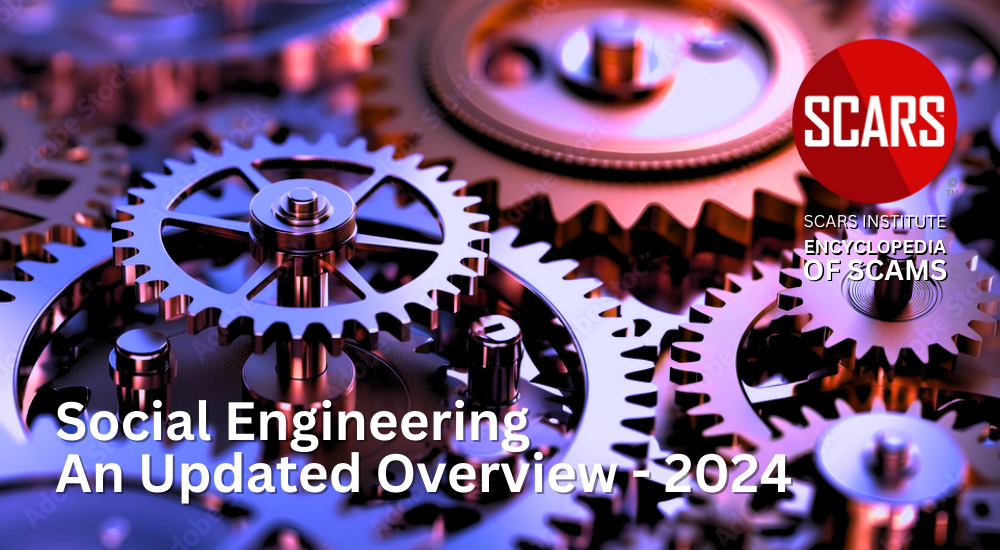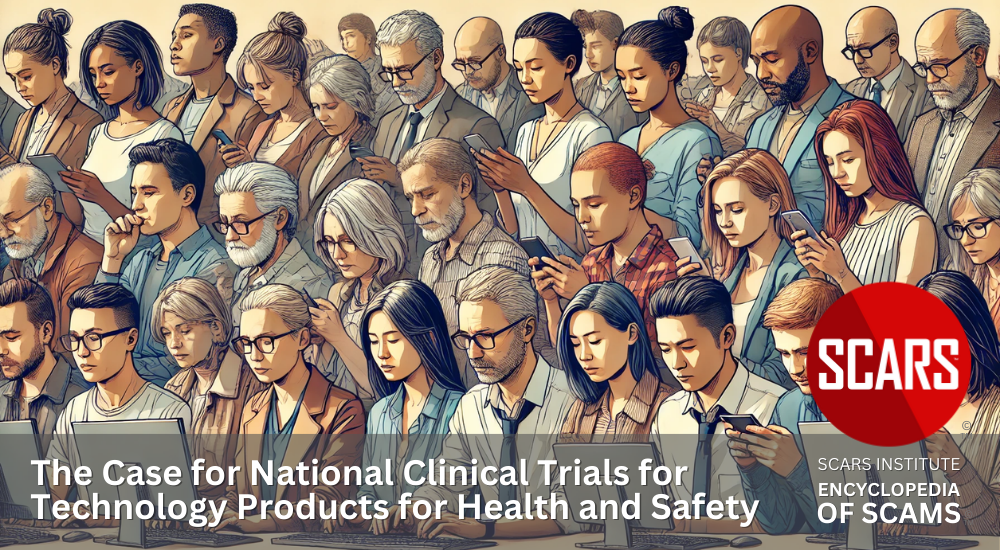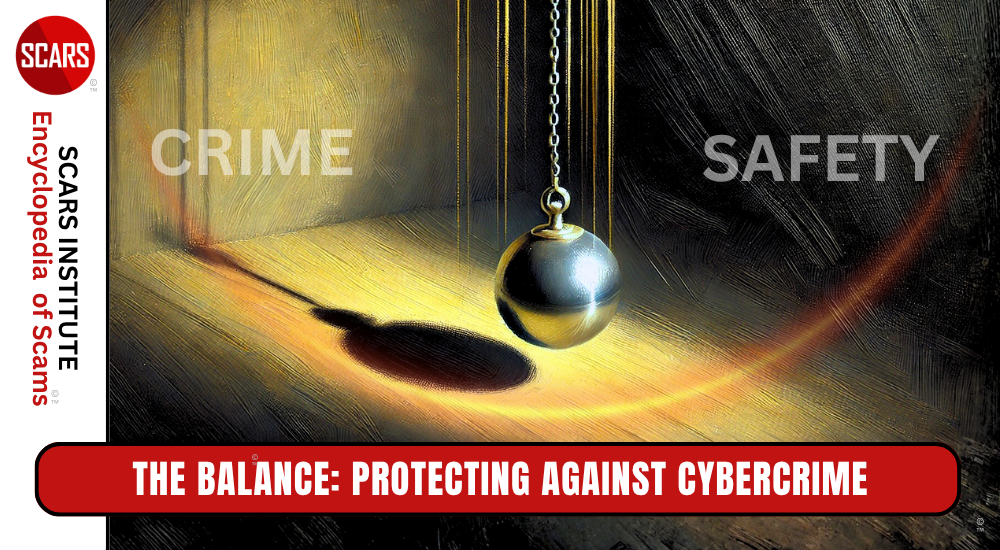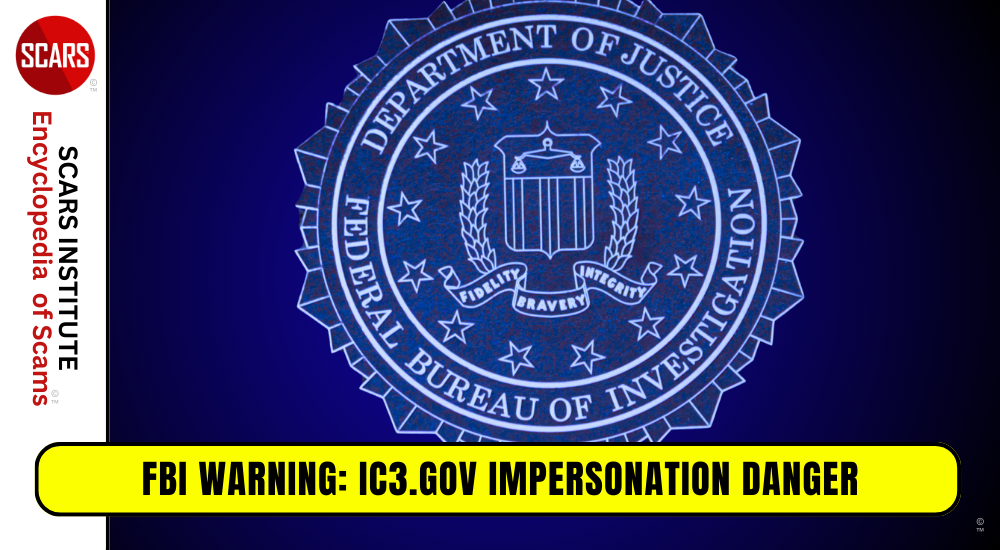
SCARS Institute’s Encyclopedia of Scams™ Published Continuously for 25 Years

The Case for National Clinical Trials for Technology Products for Health and Safety
A Presidential Proposal from the Emeritus Council (SCARS Institute Affiliate Organization)
Presented by the SCARS Institute
Author:
• By Tim McGuinness, Ph.D., DFin, MCPO, MAnth – Research Partner, Emeritus Council (also Managing Director of the SCARS Institute)
• Reprinted with permission
Article Abstract
A structured regulatory approach for technology products, akin to clinical trials for medical devices, could help ensure safety and mental well-being before release. Just as clinical trials validate pharmaceuticals, tech products and online platforms—especially those influencing mental health—should undergo thorough evaluations.
This could be overseen by the National Institute of Standards and Technology (NIST), responsible for establishing safety standards, testing in phases, and requiring transparency in reporting potential risks. In partnership with the National Institute of Mental Health (NIMH), which would assess the psychological impacts, NIST could mandate mental health criteria for product evaluation. Together, they would set holistic standards for user safety, building trust and accountability in tech.
This dual-agency framework would encourage ethical design, offering data-driven policies for healthier user interactions and ongoing post-release monitoring, ultimately making technology a responsible, positive force in society.
The Case for National Clinical Trials for Technology Products for Health and Safety
The Need for Clinical Trials for Technology Products: Ensuring Safety and Efficacy Before Public Release
The rapid development and deployment of new technology products have brought unprecedented convenience, connection, and functionality to our lives. Yet, the same speed that brings innovation to market also means these products often lack thorough testing on their impacts, especially regarding user well-being and mental health. Just as pharmaceuticals and medical devices undergo rigorous clinical trials to ensure they are safe and effective, technology products—particularly online platforms and applications—could benefit from similar evaluations before being widely released. Here’s why a clinical trial process is essential for tech and how it could be effectively applied to ensure technology products serve users safely and responsibly.
Why Are Clinical Trials Conducted?
Clinical trials in healthcare are designed to test new drugs, treatments, or medical devices to ensure they are safe and effective for human use. These trials typically occur in multiple stages, progressing from small groups to larger populations, assessing side effects, effectiveness, and any risks involved. The goal is to protect the public by ensuring that new medical interventions provide a net positive impact on health and well-being, and any adverse effects are identified and addressed before the product reaches the market.
For a clinical trial to be considered successful, the product must demonstrate clear benefits that outweigh any potential risks. Only after passing through various stages of testing and approval from regulatory bodies can it be made available to the general public. This rigorous approach to validation helps maintain safety standards, protects public health, and fosters trust in healthcare.
Why Technology Products Need Clinical Trial-Like Evaluations
With the increased integration of technology into our daily lives, technology products and online platforms wield substantial influence over mental health, social dynamics, and individual behavior. Social media, for instance, affects mood, self-esteem, and even sleep, while some apps and platforms have been linked to rising anxiety and depression rates, especially among younger users. Given these potential consequences, it’s logical to require a thorough evaluation process, similar to clinical trials, to assess the impact and safety of these platforms before their general release.
-
- Preventing Unintended Harm: Many technology products are released without fully understanding their social and psychological effects. For instance, algorithms designed to increase engagement on social media can inadvertently contribute to anxiety, depression, or addiction. Clinical trial-like evaluations could help identify these issues early and ensure the product can be modified to mitigate harmful outcomes.
- Building Trust in Technology: Just as consumers trust FDA-approved drugs due to the rigorous testing involved, similar trust could be fostered in technology products if they underwent comprehensive trials. This could be particularly beneficial in an era where users are increasingly concerned about data privacy, mental health effects, and the ethical design of tech products.
- Setting a Standard for Safety and Responsibility: Clinical trials in tech would establish a clear standard of accountability for technology companies. Rather than pushing products to market for financial gain without fully considering user impact, companies would be incentivized to prioritize safety, transparency, and user well-being.
The Clinical Trial Process and How It Could Apply to Tech
Clinical trials typically follow a structured process divided into phases, each with a distinct purpose. Here’s how each phase might look if applied to technology products:
Phase 1: Initial Testing with Limited Participants
The first stage of clinical trials is generally a small-scale test of the product on a limited number of participants, often to evaluate basic safety and identify any immediate harmful effects. For technology products, this phase could involve testing the initial version of the product with a select group of users, closely monitoring for any adverse effects related to mental health, social well-being, or addictive tendencies.
For instance, a new social media platform might start by assessing how its features affect user engagement patterns, stress levels, and sleep quality, using both quantitative (time spent, frequency of use) and qualitative (self-reported mood, feelings of well-being) data.
Phase 2: Expanded Trials for Usability and Impact Assessment
In traditional clinical trials, Phase 2 expands the pool of participants to better assess effectiveness, side effects, and usability. For tech products, this phase could include a larger user base to better understand how different demographic groups interact with the product and identify any subgroup-specific effects.
For a tech trial, this might involve a diverse range of participants, including age, gender, and cultural differences, to see how various user groups respond. Metrics such as mood, satisfaction, ease of use, and any psychological or physical side effects would be carefully recorded and analyzed. This stage would also be ideal for testing product features that could be harmful or beneficial, allowing developers to make adjustments based on real-world data.
Phase 3: Large-Scale Testing and Fine-Tuning
The third phase involves an even larger participant base, testing the product under conditions closer to real-world usage. In tech, this could look like a beta release, where thousands or tens of thousands of users access the product over a set period while being monitored for specific outcomes.
In this phase, developers would analyze how the product performs at scale and look for less common adverse effects that might only emerge with broader use. For example, an app might reveal unintended consequences at this stage, such as creating social pressure, increasing FOMO (fear of missing out), or inadvertently promoting unhealthy habits. These issues would be flagged for refinement or possibly re-engineered before a full-scale release.
Phase 4: Post-Release Monitoring and Adjustments
Even after a product passes all testing phases and is released to the public, clinical trials require ongoing monitoring for long-term side effects. For technology products, this could mean ongoing evaluation of user feedback, updated psychological impact assessments, and algorithm adjustments. Just as pharmaceutical companies are held accountable to report and address side effects, tech companies could be required to continually monitor the product’s societal and psychological impact.
This phase would ensure that if harmful effects become apparent after release, they can be swiftly addressed, and the product can be modified to prevent further harm. For instance, if a social media platform finds that its new engagement algorithm contributes to heightened anxiety or isolation, the company would be obligated to implement changes to mitigate these issues.
Potential Challenges and Considerations
While the clinical trial model holds great promise for technology, several challenges must be addressed for it to be practical:
- Defining Clear Standards for “Harm”: Unlike medical trials, where physical harm is often easy to identify, tech trials would need a framework for assessing psychological, emotional, and behavioral harm. Developing clear, measurable standards for what constitutes harm in tech will be essential.
- Regulatory Oversight and Ethical Concerns: Who would oversee these trials and ensure unbiased results? Regulatory agencies, academic institutions, and independent review boards might need to collaborate to avoid conflicts of interest and ensure accountability.
- Privacy Concerns: In-depth monitoring and data collection for trials must protect user privacy. Data collected during these evaluations would need to adhere to strict privacy standards, with transparency around what data is collected and how it is used.
- The Pace of Innovation: Technology moves much faster than traditional product development, so finding ways to conduct efficient, thorough testing without stalling innovation will be key.
Conclusion: The Case for Responsible Innovation
Applying clinical trial methodologies to technology products may seem radical, but it’s becoming increasingly necessary. As tech products and platforms wield greater influence over our mental health, social behaviors, and daily lives, ensuring they are safe and beneficial is not just responsible—it’s essential. Clinical trials would allow technology companies to validate the effectiveness and safety of their products while building user trust and promoting transparency.
By adopting a trial-based approach, tech companies could become leaders in ethical innovation, offering products that prioritize user well-being alongside engagement and profitability. As we move forward, clinical trial frameworks could be the key to making technology safer, more responsible, and better aligned with the needs of society.
The Role of NIST and NIMH in Regulating Technology: A New Framework for Safety and Mental Health Evaluation
To ensure that technology products and platforms are developed and released with public safety in mind, a regulatory framework akin to the FDA’s oversight of pharmaceuticals and medical devices is essential. The U.S. National Institute of Standards and Technology (NIST), already renowned for its role in setting standards across a variety of scientific and technological fields, could serve as the regulatory body overseeing clinical testing and validation of tech products. By empowering NIST with regulatory authority, the U.S. government could establish a trusted and robust framework to assess the safety, efficacy, and ethical standards of technology products before they reach the public. Additionally, involving the National Institute of Mental Health (NIMH) in collaboration with NIST could provide a much-needed mental health perspective, ensuring the evaluation of psychological impacts alongside technical and functional assessments.
NIST as the Regulatory Agency for Technology Safety Standards
NIST’s mission is to promote U.S. innovation and industrial competitiveness by advancing measurement science, standards, and technology. Given its expertise in technical standards and rigorous testing protocols, NIST is well-positioned to develop and enforce regulations that could bring greater accountability to tech product development. Here’s how NIST could function as a regulatory agency for technology:
-
- Establishing Safety and Performance Standards: NIST could set baseline standards for safety, user privacy, and performance that technology products must meet before release. This would include not only functional criteria but also safeguards to minimize data privacy risks, security vulnerabilities, and potential physical or psychological harm to users.
- Mandating Clinical Trials for High-Impact Products: Like the FDA does with drugs and medical devices, NIST could require technology companies to submit their products for a multi-phase clinical trial process. This would assess not only functionality and user experience but also the short- and long-term impact on mental health and social well-being. NIST would develop guidelines for these trials, ensuring that companies adhere to a standardized, objective process before a product or platform goes live.
- Ongoing Compliance and Post-Release Monitoring: Even after initial trials, NIST would have the authority to conduct ongoing evaluations of technology products, similar to the FDA’s post-market surveillance for pharmaceuticals. This would involve monitoring products over time to identify any emerging risks or unintended consequences. NIST could mandate periodic audits and updates to ensure continued compliance with established standards.
- Establishing Transparency Requirements: NIST’s oversight would also emphasize transparency, ensuring that companies disclose potential risks associated with their products. Tech companies would be required to publish clear, accessible information about the psychological, social, and physical impacts that their products may have on users. This transparency would empower consumers to make informed choices about technology usage.
Empowering the NIMH to Evaluate Mental Health Implications
The National Institute for Mental Health (NIMH), as the leading government organization on mental health research, would play a crucial role in assessing the psychological and emotional impacts of technology products. In partnership with NIST, NIMH could contribute its expertise in mental health research to address the growing concerns about technology’s effects on mental health, particularly with regard to social media, online gaming, and digital communication platforms.
-
- Developing Mental Health Assessment Criteria: NIMH could work with NIST to create specific criteria to evaluate the mental health impact of tech products. These criteria would focus on areas like stress, anxiety, depression, addiction, and social isolation. For example, NIMH could establish parameters for measuring the extent to which a platform might exacerbate or mitigate these issues, guiding companies in designing features that are less likely to harm mental well-being.
- Conducting Psychological Testing as Part of Clinical Trials: By embedding mental health assessments into NIST’s mandated clinical trials, NIMH could ensure that the psychological consequences of technology are evaluated from the start. This would involve direct feedback from trial participants on mental health markers, including stress, self-esteem, mood, and sleep quality, to identify any adverse effects on emotional and psychological well-being.
- Guidelines for Algorithm Design and Usage: Many tech products rely on algorithms that drive user engagement, but these algorithms can sometimes lead to addictive or unhealthy behavior patterns. NIMH could contribute guidelines for designing algorithms that promote healthier user interactions, reducing tendencies toward anxiety, social comparison, or compulsive use. These guidelines would help tech companies align their algorithms with best practices for mental health.
- Ongoing Monitoring of Mental Health Impacts Post-Release: Similar to NIST’s role in ongoing safety monitoring, NIMH would continue to monitor the mental health impacts of technology after release. Through regular surveys, psychological studies, and user feedback mechanisms, NIMH could assess any longer-term psychological effects and recommend modifications if needed. This ongoing monitoring would be particularly crucial for products targeting vulnerable populations, such as adolescents and young adults.
Benefits of a NIST-NIMH Partnership
By collaborating, NIST and NIMH could offer a balanced regulatory approach that evaluates both the technical safety and mental health impact of technology products. This partnership would bring several important benefits:
-
- Holistic Safety and Well-Being Standards: With NIST focusing on technical and security standards, and NIMH on mental health, the partnership would ensure that technology products meet comprehensive standards for user safety and well-being.
- Data-Driven Policy for Mental Health: NIMH’s research expertise would help create data-driven policies that prioritize mental health, enabling technology products to support rather than undermine users’ emotional well-being.
- Enhanced Public Trust in Technology: Just as the public trusts the FDA for safeguarding their health with rigorous drug evaluations, a NIST-NIMH collaboration would build trust in technology products. Users could feel more secure knowing these products meet both technical and mental health standards.
- Encouraging Ethical Design Practices: This dual-agency approach would incentivize tech companies to adopt more ethical design practices, prioritizing user well-being as a core component of product development.
Conclusion: Toward Responsible Innovation in Technology
Technology products today shape not only how we live but also how we think, feel, and interact. With such a powerful influence on society, these products must be developed responsibly and ethically. By empowering NIST to regulate the technical aspects of technology and NIMH to evaluate mental health implications, we can create a safer and more accountable tech industry.
A NIST-NIMH regulatory framework would ensure that products are not only technically sound but also psychologically safe, setting a new standard for responsible innovation. As technology continues to evolve, this partnership could play a crucial role in protecting users, promoting well-being, and building a future where technology serves as a positive force in society.
-/ 30 /-
What do you think about this?
Please share your thoughts in a comment below!
Table of Contents
- A Presidential Proposal from the Emeritus Council (SCARS Institute Affiliate Organization)
- Article Abstract
- The Case for National Clinical Trials for Technology Products for Health and Safety
- The Need for Clinical Trials for Technology Products: Ensuring Safety and Efficacy Before Public Release
- The Clinical Trial Process and How It Could Apply to Tech
- Potential Challenges and Considerations
- The Role of NIST and NIMH in Regulating Technology: A New Framework for Safety and Mental Health Evaluation
LEAVE A COMMENT?
Recent Comments
On Other Articles
- Arwyn Lautenschlager on Love Bombing And How Romance Scam Victims Are Forced To Feel: “I was love bombed to the point that I would do just about anything for the scammer(s). I was told…” Feb 11, 14:24
- on Dani Daniels (Kira Lee Orsag): Another Scammer’s Favorite: “You provide a valuable service! I wish more people knew about it!” Feb 10, 15:05
- on Danielle Delaunay/Danielle Genevieve – Stolen Identity/Stolen Photos – Impersonation Victim UPDATED 2024: “We highly recommend that you simply turn away form the scam and scammers, and focus on the development of a…” Feb 4, 19:47
- on The Art Of Deception: The Fundamental Principals Of Successful Deceptions – 2024: “I experienced many of the deceptive tactics that romance scammers use. I was told various stories of hardship and why…” Feb 4, 15:27
- on Danielle Delaunay/Danielle Genevieve – Stolen Identity/Stolen Photos – Impersonation Victim UPDATED 2024: “Yes, I’m in that exact situation also. “Danielle” has seriously scammed me for 3 years now. “She” (he) doesn’t know…” Feb 4, 14:58
- on An Essay on Justice and Money Recovery – 2026: “you are so right I accidentally clicked on online justice I signed an agreement for 12k upfront but cd only…” Feb 3, 08:16
- on The SCARS Institute Top 50 Celebrity Impersonation Scams – 2025: “Quora has had visits from scammers pretending to be Keanu Reeves and Paul McCartney in 2025 and 2026.” Jan 27, 17:45
- on Scam Victims Should Limit Their Exposure To Scam News & Scammer Photos: “I used to look at scammers photos all the time; however, I don’t feel the need to do it anymore.…” Jan 26, 23:19
- on After A Scam, No One Can Tell You How You Will React: “This article was very informative, my scams happened 5 years ago; however, l do remember several of those emotions and/or…” Jan 23, 17:17
- on Situational Awareness and How Trauma Makes Scam Victims Less Safe – 2024: “I need to be more observant and I am practicing situational awareness. I’m saving this article to remind me of…” Jan 21, 22:55
ARTICLE META
Important Information for New Scam Victims
- Please visit www.ScamVictimsSupport.org – a SCARS Website for New Scam Victims & Sextortion Victims
- Enroll in FREE SCARS Scam Survivor’s School now at www.SCARSeducation.org
- Please visit www.ScamPsychology.org – to more fully understand the psychological concepts involved in scams and scam victim recovery
If you are looking for local trauma counselors please visit counseling.AgainstScams.org or join SCARS for our counseling/therapy benefit: membership.AgainstScams.org
If you need to speak with someone now, you can dial 988 or find phone numbers for crisis hotlines all around the world here: www.opencounseling.com/suicide-hotlines
A Note About Labeling!
We often use the term ‘scam victim’ in our articles, but this is a convenience to help those searching for information in search engines like Google. It is just a convenience and has no deeper meaning. If you have come through such an experience, YOU are a Survivor! It was not your fault. You are not alone! Axios!
A Question of Trust
At the SCARS Institute, we invite you to do your own research on the topics we speak about and publish, Our team investigates the subject being discussed, especially when it comes to understanding the scam victims-survivors experience. You can do Google searches but in many cases, you will have to wade through scientific papers and studies. However, remember that biases and perspectives matter and influence the outcome. Regardless, we encourage you to explore these topics as thoroughly as you can for your own awareness.
Statement About Victim Blaming
SCARS Institute articles examine different aspects of the scam victim experience, as well as those who may have been secondary victims. This work focuses on understanding victimization through the science of victimology, including common psychological and behavioral responses. The purpose is to help victims and survivors understand why these crimes occurred, reduce shame and self-blame, strengthen recovery programs and victim opportunities, and lower the risk of future victimization.
At times, these discussions may sound uncomfortable, overwhelming, or may be mistaken for blame. They are not. Scam victims are never blamed. Our goal is to explain the mechanisms of deception and the human responses that scammers exploit, and the processes that occur after the scam ends, so victims can better understand what happened to them and why it felt convincing at the time, and what the path looks like going forward.
Articles that address the psychology, neurology, physiology, and other characteristics of scams and the victim experience recognize that all people share cognitive and emotional traits that can be manipulated under the right conditions. These characteristics are not flaws. They are normal human functions that criminals deliberately exploit. Victims typically have little awareness of these mechanisms while a scam is unfolding and a very limited ability to control them. Awareness often comes only after the harm has occurred.
By explaining these processes, these articles help victims make sense of their experiences, understand common post-scam reactions, and identify ways to protect themselves moving forward. This knowledge supports recovery by replacing confusion and self-blame with clarity, context, and self-compassion.
Additional educational material on these topics is available at ScamPsychology.org – ScamsNOW.com and other SCARS Institute websites.
Psychology Disclaimer:
All articles about psychology and the human brain on this website are for information & education only
The information provided in this article is intended for educational and self-help purposes only and should not be construed as a substitute for professional therapy or counseling.
While any self-help techniques outlined herein may be beneficial for scam victims seeking to recover from their experience and move towards recovery, it is important to consult with a qualified mental health professional before initiating any course of action. Each individual’s experience and needs are unique, and what works for one person may not be suitable for another.
Additionally, any approach may not be appropriate for individuals with certain pre-existing mental health conditions or trauma histories. It is advisable to seek guidance from a licensed therapist or counselor who can provide personalized support, guidance, and treatment tailored to your specific needs.
If you are experiencing significant distress or emotional difficulties related to a scam or other traumatic event, please consult your doctor or mental health provider for appropriate care and support.
Also read our SCARS Institute Statement about Professional Care for Scam Victims – click here to go to our ScamsNOW.com website.
















Thank you for your comment. You may receive an email to follow up. We never share your data with marketers.